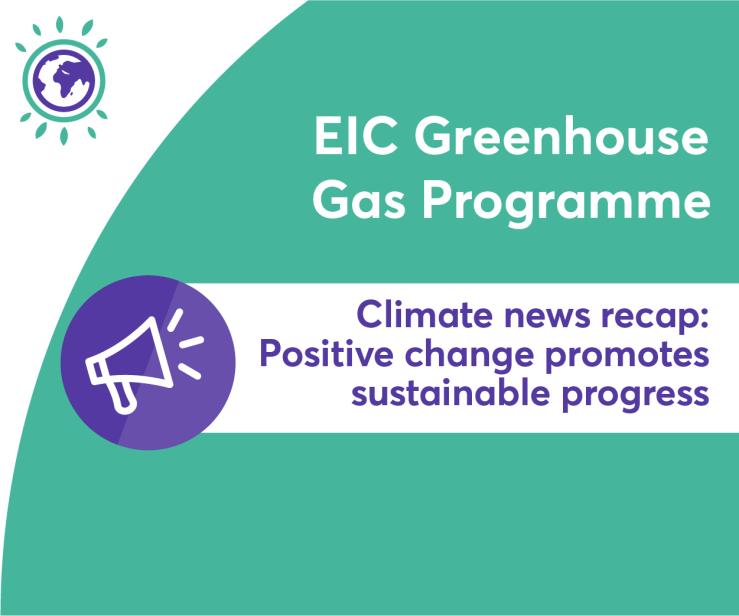Climate change-related matters, and their impacts, continue to be an important subject with each passing day. As part of the European Innovation Council (EIC), we’re continuing to give serious focus to the Greenhouse Gas Programme (GHG) initiative with a fresh round of dedicated news that brings you the latest and trendiest pieces of information on climate action and its imperatives.
Adapting to climate change is essential and is happening worldwide. With the climate change impacts being noticeable throughout various sectors of society, it’s important to have a broad perspective about what’s happening in our world in this regard. That’s why we’re maintaining our mission of inspiring entrepreneurial innovators in all climate-related matters as a way of helping transform how environmental topics are addressed. One of the services of the EIC GHG programme is a regular news recap initiative, that began last year, to give an in-depth view on topics. Keep reading to know more about what we’ve put together this time around.
SMEs equipped to join race to net-zero with dedicated climate disclosure framework
With the transition to net-zero underway, towards the end of 2021, CDP launched a new climate disclosure framework, in collaboration with the SME Climate Hub. This enabled the opportunity to create a partnership with the Exponential Roadmap Initiative and Normative to empower small and medium-sized enterprises (SMEs).
The goal? To make strategic and impactful climate commitments. The intention is also to have the means to track and report progress against those commitments, plus demonstrate climate proactivity and leadership.
More and more, SMEs require to take climate action to 1) build – and achieve – business resilience, 2) gain competitive advantage, 3) keep up with supply chain demands, 4) policy regulation, and 5) meet consumer expectations.
This need for business transformation has been driven mostly by large, high emitting, global corporations. Having said that, SMEs are a significant force behind innovative climate solutions, and this initiative now makes it possible to attract more investments and expand businesses. To note, SMEs represent close to 90% of businesses and more than 50% of employment worldwide. Therefore, it’s pivotal that they are equipped with tools and resources that help them align their commitments to a 1.5°C future and disclose environmental performance.
To assist with that, the new open SME Climate Disclosure Framework is key. It will build upon CDP’s expansive experience working with corporations, including +1800 disclosing SMEs ranging from +50 countries, and it’s made to be simple, flexible, easy to understand, and accessible to all. SMEs can now report their climate impacts and strategies to various stakeholders more easily.
The new RED should guarantee SMEs’ competitiveness
On that same note, SMEunited has adopted its position paper on the amendments to the Renewable Energy Directive (RED). SMEs have played an important role in higher levels of renewable energy in the EU – for instance, as technology providers, installers, or balancing players in energy communities.
Now, according to SMEunited, SMEs will also become key actors in achieving the new 2030 target of the revised RED if they’re able to:
-
Keep increasing the usage of renewable energy and foster it while keeping administrative burdens and costs to a minimum under the ‘Fit for 55’ package.
-
Make an in-depth impact assessment at the end of the legislative process of the ‘Fit for 55’ package to ensure the outcomes provide SMEs with the best support to go through the green transition.
-
Guarantee that the increased switch to non-fossil energy grants SMEs the necessary amount of reasonably priced renewable energy required to carry out their activities and remain competitive.
-
Assure public administrations give SMEs a predictable business environment and clear conditions under which they can deliver on the ‘Fit for 55’ package.
On top of this, RED must also ensure SMEs possess an enabling framework that fosters interconnections, transmission and distribution networks, and storage possibilities.
As a way of actively harnessing critical information that goes in line with the ‘global evolution towards a more sustainable economy’ we’re facing to preserve modern society for future generations, these are just a few of the articles that made the headlines in the past months.
If, after reading this, you’re asking yourself how you can also contribute to the solution in line with your capabilities, here’s our answer. As an EIC-funded SME, you can join the initiatives of the EIC GHG programme, be it the co-creation activities, the badges & CO2 neutral label, the resource library or by using the EIC GHG Tool. Being a journey towards carbon neutrality, with a set of unique steps that you can benefit from, this programme will aid you in making your green contribution towards a cleaner and safer planet.
About the EIC GHG programme
With the EIC GHG programme, part of the Business Acceleration Services, the EIC offers its beneficiaries the support and expertise needed to assess, track and efficiently reduce their carbon footprint using a dedicated GHG Tool, the Badges & Label function, and further resources.
In addition, co-creation activities with corporates, industrial associations, regions in carbon transition and other EIC beneficiaries are planned. More information on the EIC GHG programme can be found here.
Did you hear about the latest EIC GHG Tool?
As a way of efficiently reducing carbon emissions and developing other sustainable practices to help our planet, this initiative is meant to offer EIC beneficiaries the opportunity to calculate, track & monitor CO2 emissions, plus simulate mitigation measures to make your business more sustainable.

DISCLAIMER: This information is provided in the interest of knowledge sharing and should not be interpreted as the official view of the European Commission, or any other organisation.

